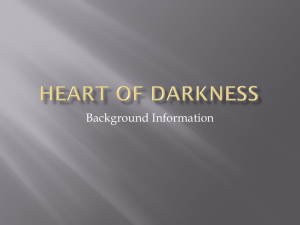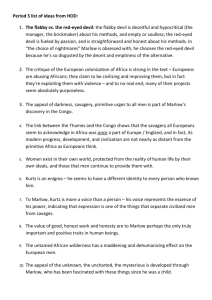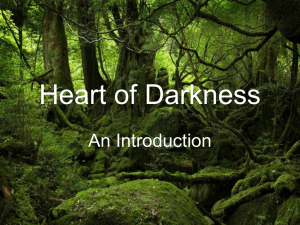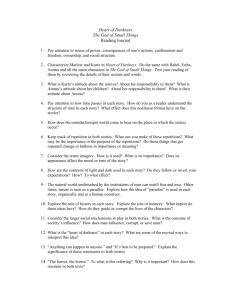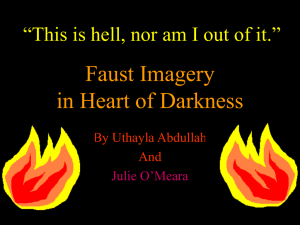Heart of Darkness
advertisement
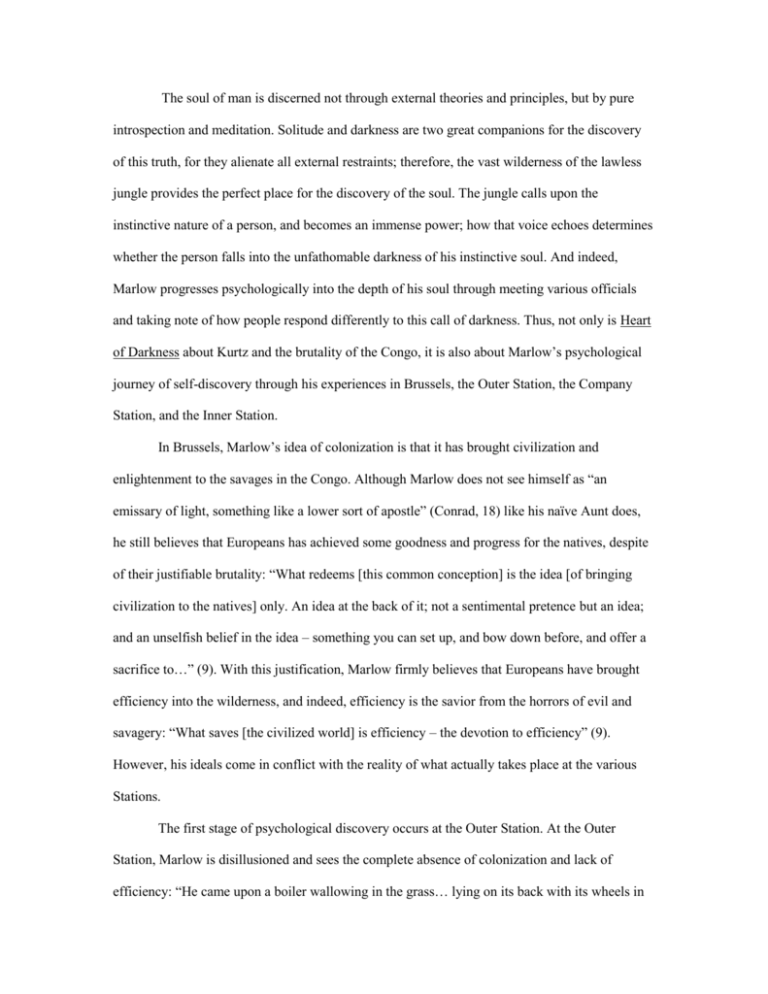
The soul of man is discerned not through external theories and principles, but by pure introspection and meditation. Solitude and darkness are two great companions for the discovery of this truth, for they alienate all external restraints; therefore, the vast wilderness of the lawless jungle provides the perfect place for the discovery of the soul. The jungle calls upon the instinctive nature of a person, and becomes an immense power; how that voice echoes determines whether the person falls into the unfathomable darkness of his instinctive soul. And indeed, Marlow progresses psychologically into the depth of his soul through meeting various officials and taking note of how people respond differently to this call of darkness. Thus, not only is Heart of Darkness about Kurtz and the brutality of the Congo, it is also about Marlow’s psychological journey of self-discovery through his experiences in Brussels, the Outer Station, the Company Station, and the Inner Station. In Brussels, Marlow’s idea of colonization is that it has brought civilization and enlightenment to the savages in the Congo. Although Marlow does not see himself as “an emissary of light, something like a lower sort of apostle” (Conrad, 18) like his naïve Aunt does, he still believes that Europeans has achieved some goodness and progress for the natives, despite of their justifiable brutality: “What redeems [this common conception] is the idea [of bringing civilization to the natives] only. An idea at the back of it; not a sentimental pretence but an idea; and an unselfish belief in the idea – something you can set up, and bow down before, and offer a sacrifice to…” (9). With this justification, Marlow firmly believes that Europeans have brought efficiency into the wilderness, and indeed, efficiency is the savior from the horrors of evil and savagery: “What saves [the civilized world] is efficiency – the devotion to efficiency” (9). However, his ideals come in conflict with the reality of what actually takes place at the various Stations. The first stage of psychological discovery occurs at the Outer Station. At the Outer Station, Marlow is disillusioned and sees the complete absence of colonization and lack of efficiency: “He came upon a boiler wallowing in the grass… lying on its back with its wheels in 2 the air… as dead as a carcass of some animal…. A horn tooted to the right… [and] a heavy and dull detonation shook the ground… [This] objectless blasting was all the work that was going on.” (23-24). Events taking place there are in complete opposition with Marlow’s initial ideals. There are no enlightenment, no civilization, and no sign of progress. Marlow is more aware of the inefficiency as he descends into the edge of the forest, “the gloomy circle of some Inferno” (26), where enslaved natives are left to die. Their eyes are empty, in direct contrast with the free native Marlow has seen along the coast, who have a “wild vitality [and] an intense energy of movement” (21). Europeans have not born the “torch” (5) of enlightenment, but the banner of conquest and enslavement. Enslavement is inefficient because the idea behind civilization is to share technology, not to assert power over the weaker individuals. Yet, despite the inefficiency, the Accountant “[maintains] his appearance” (28). This “whited sepulchre” (14) resembles Marlow’s initial ideals of colonization; however, the irony is, there is no sign of civilization and work to be seen. Death and decay roam the land, and even in the very office of the Account. These contrasts disillusion Marlow of the splendor and glamour of imperialism; in the core, there is nothing but inefficiency, farcical and objectless work. At the Outer Station, Marlow also changes his views on the natives. There, he begins to look at the natives in a humanistic and comprehensive manner; it is also the first instant where he finds the jungle echoing in his heart: “Perhaps on some quiet night the tremor of far off drums… a sound weird, appealing, suggestive, and wild – and perhaps with as profound a meaning as the sound of bells in a Christian country” (31-32). This important insight suggests to Marlow that the natives and Europeans are fundamentally similar. The only difference is the external constraint, law and technology alike. And seeing the inefficiency of the supposedly enlightened Europeans, Marlow starts to ponder the reasons behind it. And at the Company Station, he realizes that Europeans are virtue savages without efficiency and morals, and would fall into evil and anarchy as much as the natives do. 3 Marlow discovers the cause of inefficiency at the Company Station. From the Manager, Marlow understands the reasons behind the inefficiency and farcical brutality: “out [in Africa] there were no external checks” (35). Nobody can enforce justice with no laws and no moral codes. Thus, with the freedom and ability to do anything, the Manager is able to maintain his routine of work: beating natives, commanding other officials, and spying on the competitive agents. The inefficiency of the Brickmaker also contradicts Marlow’s ideals: “The business [entrusted] to this fellow was the making of bricks… but there wasn’t a fragment of brick anywhere in the station” (39). Later on, Marlow is compelled to believe that work provides “the chance to find [himself]” (47); and yet, he knows that “when [one] has to attend to things of that sort, to the mere incidents of the surface, the reality… fades away” (56). Marlow is aware of some truth of the human soul, and he believes that physical work is the surface to that truth. The darkness of this truth, the inherited evil of the soul is the sole reason for inefficiency. Greed and selfishness turn Europeans to Africa, and turn man from man, and directly cause conflicts and inefficiency; the initial motive behind looting Africa is an ample example. Marlow visualizes the “loot” through the Eldorado Exploring Expedition. Marlow is cognizant that the purpose of the expedition is “to tear treasures out of the bowels of the land… with no more moral purpose at the back of it than there is in burglars breaking into a safe” (50). Marlow is clearly conscious of the darkness of souls at work behind the brutality and virtual robbery. He realizes that without external checks for justice and morality, man would succumb to the darkness. During the trip up the river, Marlow learns what is needed to fight against the call of darkness. The darkness comes from the soul, not the savages or the jungle. The innate darkness emerges and erupts when there are no external checks. Since darkness comes from within, the battle is fought within the soul. It is only through inborn strength, a capacity for belief, and restraint that evil can be detained in the soul. From the native cries, Marlow understands that there is no essential difference between him and the natives, and Marlow admits the presence of the echoes of darkness: “It was ugly enough, … but there was in [me] just the faintest trace of a 4 response to the terrible frankness of that voice, a dim suspicion of there being a meaning in which [I]… could understand” (60). The darkness calls everyone, both native and Europeans, under the lawless jungle. Marlow knows this is a call to the will of the soul, and mere intellect cannot fight against it: “[One] must meet the truth with his own true stuff – with his inborn strength. Principles won’t do…. [One] needs a deliberate belief” (60). Only a firm restraint and an “unselfish belief” (9) can save a soul from falling into savagery and anarchy, and ultimately redeem the ideals of efficiency. This restraint is most imminent for Marlow as he observes the cannibals on his steamer, while experiencing the same untamable hunger himself: “They were big powerful men, with not much capacity to weigh the consequences…. Yes; … restraint! What possible restraint…” (70). Marlow summarizes the insights he receives by comparing London life with the Congo; when the foundations of civilization such as policeman and butcher are gone, one ‘must fall back upon innate strength, … a capacity for faithfulness, [and restraint]” (82). At the Inner Station, Marlow visualizes the embodiment of the lack of restraint. He meets Kurtz. Kurtz would kill the Russian, suppress the natives, and take the seat of God simply because he is the law. As the Russian says, “He could do [anything], and had a fancy for it, and there was nothing on earth to prevent him killing whom he jolly well please” (95). The skulls on the posts that Kurtz has extracted from the rebels are signs of his lack of restraint. “[The Skulls] only showed Mr. Kurtz lacked restraint in the gratification of the various lusts…” (97). The lack of restraint is also relevant in other characters; for example, Fresleven lacks restraint in asserting his superiority over the natives, the Manager wants to hang the Russian for competition, and the pilgrims lack restraint in the face of the native attack. At Kurtz’s final moment, Kurtz realizes his evil, “Horror, horror!” (118). This is why Marlow finds Kurtz “remarkable” (199). Kurtz was able to be in the depth of a deliberate evil, yet conscious of the atrocities; he was able to see his evils and tell the horrors of the darkness, though it “came to him at last – at the very last” (98). Marlow is aware of the fact that the lack of self-control leads Kurtz into the horrors of darkness. And thus, the meeting with Kurtz reinforces Marlow’s theory of fighting against darkness – that restraint, 5 inner strength of will, and the firm intellectual belief in the will are the only opponents for the imminent and perpetual call of the great darkness. This reinforcement fortifies Marlow’s belief in his strength, and allows him to resist the very temptation of the wild on his trip back. Marlow is aware of the essential difference between civilization and savagery, between good and evil: “Perhaps all the wisdom, and all truth, and all sincerity, are just compressed into that inappreciable moment of time in which we step over the threshold of the invisible” (120). With the belief in restraint and strength that he has established through confronting the “horrors” of Kurtz’s life, Marlow is able to “draw back [his] hesitating foot” (120). It is through immense struggle that Marlow learns the power of darkness and fight with it: not with theories and ideals, but with experience. It is through this actual struggle that Marlow is truly enlightened, reaching the ends of the heart of darkness and returns. As Marlow sets sail back to Belgium, he is completely changed. He realizes that the Europeans have never experienced the struggle against the voice of darkness and the temptation of the wilderness. They live in a mirage, incapable of understanding the inner darkness of their true selves: “They were intruders whose knowledge of life was to [Marlow] an irritating pretence, because [Marlow] felt so sure they could not possibly know the things [Marlow] knew…” (120121). The Intended embodies the Europeans in mirage. She believes that she has all Kurtz’s noble confidence and knows him best (127). She is the “thunderingly exalted creature, … deaf and blind to anything but heavenly sights and sounds” (83), whilst the Europeans “are fools too dull to know that they are being [assaulted] by darkness” (82). Enlightened through the experience with darkness, Marlow is capable of judging others. He is conscious of the fact that the Europeans are too foolish to know the darkness in their souls, simply because they never have to confront it. Thus, they live in an illusion. Heart of Darkness is not a story about the Belgian officials. They merely provide means for Marlow to discover and uncover the truth hidden in all souls. In the Congo, where societal restraints are absent, men would resort to their basic instincts to survive. Alone without external 6 checks, equipped with nothing but his own will and his self-control, Marlow resists the darkness and returns enlightened; he learns the truth of darkness in all souls through a bitter struggle with it. “Look into yourself; there you will find the Way of the universe, the truth, and the nature.” Thus says Lao Tsu. Indeed, as Marlow looks into himself, he finds the truth. Yet within the truth of the souls, there is nothing but an impenetrable darkness.

